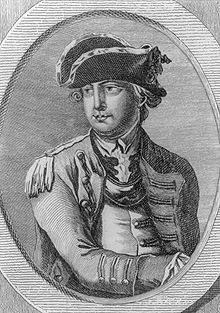Charles Lee (general)
| Charles Lee | |
|---|---|
 |
|
| Born | 6 February 1732 [O.S. 26 January 1731] Darnhall, Cheshire, England |
| Died | 2 October 1782 (aged 50) Philadelphia, Pennsylvania, U.S. |
| Buried at | Christ Church, Philadelphia |
| Allegiance |
|
| Service/branch |
|
| Years of service |
British Army: 1747–1763 |
| Rank |
British Army: Lieutenant Colonel |
| Unit | 44th Foot, 103rd Foot |
| Commands held | Southern Department of the Continental Army |
| Battles/wars | |
| Signature | |
British Army: 1747–1763
British Army: Lieutenant Colonel
Polish Army: Major General
Charles Lee (6 February 1732 [O.S. 26 January 1731] – 2 October 1782) served as a general of the Continental Army during the American War of Independence. He also served earlier in the British Army during the Seven Years War. He sold his commission after the Seven Years War and served for a time in the Polish army of King Stanislaus II.
Lee moved to North America in 1773 and bought an estate in Virginia. When the fighting broke out in the American War of Independence in 1775, he volunteered to serve with rebel forces. Lee's ambitions to become Commander in Chief of the Continental Army were thwarted by the appointment of George Washington to that post.
During 1776, forces under his command repulsed a British attempt to capture Charleston, which boosted his standing with the army and Congress. Later that year, he was captured by British cavalry under Banastre Tarleton; he was held by the British as a prisoner until exchanged in 1778. During the decisive Battle of Monmouth later that year, Lee led an assault on the British that miscarried. He was subsequently court-martialed and his military service brought to an end. He died in Philadelphia in 1782.
Lee was born on February 6, 1732 [O.S. 26 January 1731] in Darnhall, Cheshire, England, the son of Major General John Lee and his wife Isabella Bunbury (daughter of Sir Henry Bunbury, 3rd Baronet). He was sent to King Edward VI School, Bury St Edmunds, a free grammar school, and later to Switzerland, where he became proficient in several languages, including Latin, Greek, and French. His father was colonel of the 55th Foot (later renumbered the 44th) when he purchased a commission on April 9, 1747 for Charles as an entry-level ensign in the same regiment.
...
Wikipedia
